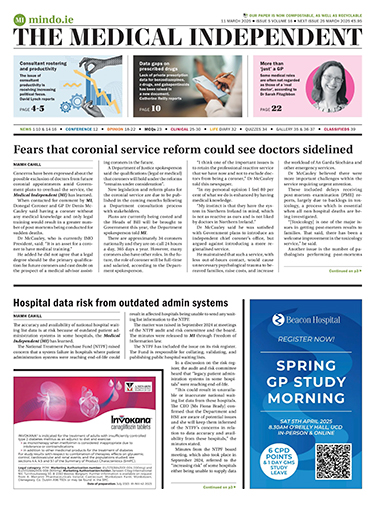Dr Rob Hendry, Medical Director at the Medical Protection Society, advises on some medico-legal dilemmas faced by healthcare professionals managing Covid-19 in Ireland.
Q. I am having to do increasingly more remote consultations – is there any advice and how does this affect my indemnity?
We understand that in the current situation doctors may have to consult with patients remotely more frequently than normal.
The practitioner should inform the patient why, on that particular occasion, they are proceeding with a remote consultation. In making the decision to consult remotely, the practitioner must balance the risks and benefits in how they consult with their patients and how they advise them. They must also be satisfied that they can adequately and clinically assess the patient remotely.
Regardless of the unique circumstances, we would recommend doctors make a record of the reasoning behind any decisions made, and the information given to patients, in case it is necessary to explain the approach taken later.
Please be reassured that should you need to do a remote consultation with a patient whom you would ordinarily see face-to-face, your membership with Medical Protection will enable you to request assistance for matters that could arise from such consultations during this time.
Q. I’m worried my working conditions and environment during this crisis may be unsafe – how can I protect my own health, and protect myself from potential errors resulting from these circumstances?
Firstly, employers have a duty of care to all their employees to ensure that the environment is safe to work in. It would be wise to discuss the contingency plans that are in place in your employing organisation now, so that everyone has a clear understanding of the risks that staff may face and the actions and procedures that will be put in place to protect staff.
Your own health is important, and the Medical Council have reminded doctors of their ethical duty, according to the Guide to Professional Conduct and Ethics to selfcare in order to protect themselves, their colleagues and their patients.
The Health Protection and Surveillance Centre (HPSC) has range of guidelines on handling healthcare workers’ exposure to Covid-19, and procedures for those in contact or close contact with a confirmed case.
If you have pre-existing health conditions that place you at increased risk of infection, you should discuss working arrangements with colleagues and your employer. It may be appropriate to ask another suitably qualified clinician to take over the care of patients who are suspected to have, or have been diagnosed as having, Covid-19.
Secondly there is a risk that some systems in the healthcare sector will be put under considerable pressure and some may fail to cope or breakdown. If you are worried that patient safety or care may be compromised you should raise your concerns with other clinicians in order to agree the best course of action to ensure the best care for patients.
Doctors should record any concerns in writing, clearly and objectively setting out the reasons for their concerns and the potential impact on patient safety, with examples.
Keep a record of any correspondence or discussions about the problems you have raised and the steps that you have taken to try to remedy matters. If an adverse incident does occur, it can be useful to show that you took action. If those who are responsible do not take proper action you can consider reporting the matter further up the line of management, in line with your workplace policy.
Q. I’m concerned that I may be required to undertake duties that are outside of my specialty or expertise to help with the effort to manage Covid-19. What is the advice, and what are the indemnity arrangements?
The UK Government has indicated that there would be ‘emergency indemnity’ to enable some healthcare professionals to undertake additional or different duties if this was required, and our assumption is that this would be state-backed as it would be NHS contracted work, specifically to support the Government’s plan to manage Covid-19.
If a similar intervention was proposed in Ireland our assumption is that this would fall under CIS (State) indemnity.
However, if a doctor is asked to perform a duty that they would not normally undertake, regardless of the circumstances they need to assess whether they have the skills and competency to proceed.
This will include considering what is in the best interests of the patient. If they do not feel it is safe to proceed and that to do so would place the patient at greater risk of harm than not undertaking the duty that has been requested, then they should advise whoever has asked them to do so and explain their concerns.
It would be wise to record the details of this deliberation in case it becomes necessary to explain the reasoning behind the decision to act or not to act.
If Medical Protection members have any concerns about the duties they are currently performing to help manage Covid-19 (in a state role or in a private capacity), they should contact us for advice.
Q. Can I decline if I am asked to work beyond my clinical competence? If so, how?
Doctors should make the care of their patients their first concern.In the current crisis the expectation is that all doctors will do the best they can for their patients in the circumstances in which they find themselves and act in good faith. Sometimes in a crisis the circumstances may mean that the levels of care which would normally be given are simply not possible.
If, however, a doctor believes that they are being asked to work in a way that is placing patients at risk of harm they should raise their concerns by following the workplace policy and the Medical Council’s guidance on raising concerns in the Guide to Professional Conduct and Ethics.
When deciding how to act doctors must consider the best interests of their patients and be prepared to explain and justify their decisions and actions.
Q. What do I do if patients start demanding extra repeat prescriptions, as they want to stockpile?
There have been no reports of medicine shortages as a result of Covid-19, and the Irish Pharmacy Union has said that if and when there is a disruption in the supply of medications, pharmacists manage their stock carefully to ensure that all patients can receive a quantity of the medication to meet their immediate needs. It would be wise to look out for any further updates on this from the Department of Health and HSE.
Some practices may however still face requests from patients for extra medication to stockpile ‘just in case’. With an increasing stack of repeat prescriptions waiting to be signed by GPs, it is crucial not to rush this task or be pressured by patients into overprescribing. The practice should have a good repeat-prescribing policy in place and stick to this unless they receive official advice stating otherwise.
While medicine shortages are not anticipated at this time, the policy should include steps to take if patients do face delays obtaining routine medications.
Where there are no current concerns, honest and open communication will be key if a patient is insisting that they have extra supply, along with explaining and justifying decisions and actions. Despite this, some patients will remain angry about not being able to stockpile their prescriptions. The practice’s complaints process should be offered at the consultation should they remain dissatisfied, and conversations should be noted in the patient’s records.
Q. Do I have to see patients if the Personal Protective Equipment (PPE) run outs?
Ireland is following the World Health Organisation’s (WHO) advice in relation to infection prevention and control measures for healthcare workers caring for a patient with suspected or confirmed Covid-19.
Contact and droplet precautions are recommended for all healthcare workers caring for a patient with suspected/confirmedCovid-19. The WHO advise that provision of appropriate PPE supplies should be a national and institutional priority, and in the event that PPE runs short we would expect further guidance to be issued by HSE.
Q. I may be asked to stop routine work altogether – reviews for long term conditions, or smears for example – what if there are future medico-legal consequences, such as delayed diagnoses?
In accordance with guidance issued by the Medical Council in their Guide to Professional Conduct and Ethics (para 5.6) doctors must consider the needs of all patients alongside their primary duty to their own patients and should actively balance these duties to try to get the best possible outcomes where resources are limited.
This means that if doctors are asked to stop some routine work for the benefit of patients, generally, then this would be acceptable. We would advise complying with Medical Council guidance in this regard as well as any future guidance that may be issued by the HSE and the National Screening Service.
Medical Protection members should contact us with any concerns.
References available on request













Leave a Reply
You must be logged in to post a comment.